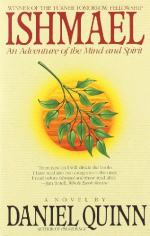
|
| Name: _________________________ | Period: ___________________ |
This test consists of 15 multiple choice questions and 5 short answer questions.
Multiple Choice Questions
1. What does the narrator talk to Art Owens about?
(a) The weather
(b) Getting Ishmael a doctor
(c) Improving Ishmael’s conditions
(d) Buying Ishmael
2. What does Ishmael say the peace-keeping law promotes?
(a) Consolidation of power
(b) Longevity
(c) Diversity
(d) Civilization
3. What is a paean?
(a) A parody
(b) A death knell
(c) A praise song
(d) A requiem
4. Why is Ishmael reticent about telling the narrator what he wants to know in Chapter 11?
(a) He feels the narrator is merely curious
(b) He is afraid that the narrator will stop coming to him once he knows
(c) He is irritated by the narrator’s failure to prevent his eviction
(d) He does not want to divulge the information
5. What does the law Ishmael believes the narartor is looking for in Chapter 8 prevent?
(a) Injustice
(b) Single-species dominance
(c) Civilization
(d) A howling chaos
6. When the narrator cannot answer Ishmael’s question, ‘how did man become man?’, how does Ishmael say they will address the question?
(a) Pragmatically
(b) Matter-of-factly
(c) Obliquely
(d) Directly
7. What does the narrator tell Ishmael he wants to know in Chapter 11?
(a) Where the Sokolows have been
(b) Where Ishmael’s other students are
(c) The Leavers’ story
(d) Why he decided to teach
8. How does Ishmael describe civilization’s progress in Chapter 7?
(a) As a building built on water
(b) As the free-fall of an aircraft that does not accord with the laws of aerodynamics
(c) As a garden that has worn out the soil
(d) As a corpse that has been kept alive artificially
9. What is the literary term for Ishmael’s saying that he is cold?
(a) Prophecy
(b) Foreshadowing
(c) Denouement
(d) Falling action
10. What does the narrator say, in Chapter 8, he would be looking for?
(a) Places where people’s stories were contradicted by their actions
(b) What the people did
(c) What the people said about their behavior
(d) What the people did not do
11. How does the narrator characterize the work, in Taker culture, of killing off nature?
(a) Tragic
(b) Necessary
(c) Sacrilegious
(d) Holy
12. How does the narrator continue his dialogue with Ishmael in a new setting in Chapter 10?
(a) He apologizes until Ishmael relents
(b) He sneaks Ishmael out of the office building
(c) He convinced the Sokolows to pay for a place for him
(d) He bribes Ishmael’s caretaker
13. How does Ishmael characterize the gods in his description of their debates?
(a) As troublemakers
(b) As wise men
(c) As squabblers
(d) As short-sighted people
14. For whose benefit does Ishmael say the Leavers accumulate and preserve knowledge?
(a) Themselves
(b) The creatures they are responsible for
(c) The community of life
(d) Their food supply
15. What does the narrator find when he returns to the office building in Chapter 10 after several days away from Ishmael?
(a) Ishmael is sick
(b) Ishmael will not talk to him
(c) Ishmael has been evicted
(d) Ishmael has died
Short Answer Questions
1. What is the second thing that the narrator says the Takers do, which is not done in nature?
2. Why does the narrator have a hard time agreeing to Art Owens’ demands?
3. Why does the narrator say he feels a particular feeling after taking a few days off from his discussion with the narrator in Chapter 8?
4. In Chapter 11, how does Ishmael define culture?
5. What scenario does Ishmael introduce to test the narrator’s ideas about his imaginary culture?
|
This section contains 662 words (approx. 3 pages at 300 words per page) |

|




